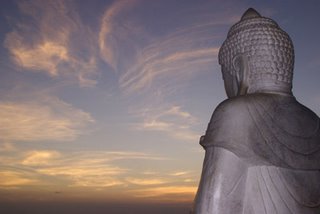
I've been interested in Buddhism since my college days. But I never saw it as a religion. I guess my family being Christians gave me a mind set of what a religion was. Since there was no deity, it couldn't be a religion. It could be a philosophy! Moreover it seemed to me that it was merely observations. It also seemed to me that many people who subscribed to it got caught up in many of the same traps that religions have. One of them was to create a sophisticated language to describe both it and the world. This is one way humanity deludes itself. By assigning a name to everything we presume to have knowledge of these same things. At best it is an attempt to allow all of us to compare our experience. At worst, it is a substitute for the essence of the experience itself. What I find so interesting is how well it fits reality as we know it. The first noble truth is that nothing lasts. Feelings, material things, worlds, universes, people... all share this quality. Everything that exists has been something else before, and somthing else before that and so on. When Sagan talked about people being made of "star stuff" it is eloquent testimony to the fact that everything becomes something else. Mighty stars become the stuff of mosquitos and humming birds. The Buddha said we suffer because we cling to things which simply cannot last. I suppose we could cling to the things whose permanence is greater than our own. But all the things that move within our timeline will change, rot, decay, vanish no matter what we do. If we can't let go of them at the proper time, we will of course feel loss and pain. The Buddha said if we want to stop suffering, we much disconnect from desires for the things which cannot last. I would guess that the greatest thing suffered by humanity is the loss of self in death. Whether that be loved ones or ourselves, this is the greatest loss we face. It isn't logical that we ignore how temporary we are. In fact many of us are gone long before our biological processes cease.
I read an interesting discussion on whether or not a person is the same from cradle to grave. It put it in the perspective of repairing a boat. Suppose you take a nice boat that you named "Jenny" and over the years as damage and decay are repaired, you move the old removed parts into a shed and replace them with new. Suppose at some point in time, you have replaced all the material of the boat and now have all the pieces of the original boat in the shed. Which one is the boat? Is "jenny" in the shed or is she at the pier? The same is true for our bodies. It is commonly believed that almost all the constituents of the body are completely replaced about every 7 to 8 years. Look at the difference between an infant and a senior citizen.
Is this the same person? The Senior won't look the same or have the same memories as a child. Every atom in his or her body will have been replaced over and over. In Buddhism it is believed that there is no self and that many things come together to produce personhood. A person is more than a body or a mind. If a person is merely a collection of molecules carrying out elaborate chemical processes over the course of years what happens when all these molecules are replaced again and again and in time cease to function as they once did?
But if all this philosophy was teaching is detachment, why bother? It is when we are engaged with life that we are fulfilled. The lesson I get is to expect and embrace the changes that must come. In the meantime it behoves us to value and cherish things when they come along realizing they don't last! It should make them more precious to us. I have been trying to live in the moment. This attitude would require me to make the most of moments as they come along and not to be overly anxious about what the future may bring or take away.
..............I'm working on it!

